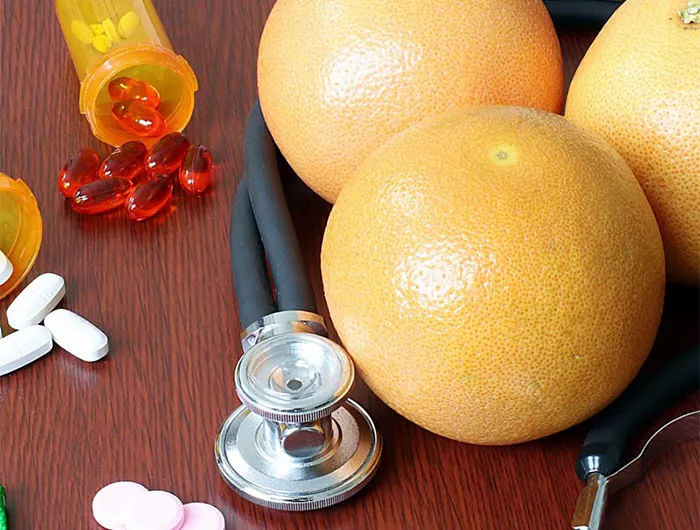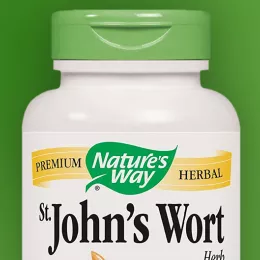When foods & drugs don't mix

Grapefruit. Kale. St. John’s wort. Some foods and supplements just don’t mix with some drugs. The wrong combo could dampen a drug’s effect...or deliver a heftier dose. Here are some of the more common ones.

Joseph Boullata is a professor of clinical nutrition at Drexel University and a pharmacy specialist at the Hospital of the University of Pennsylvania. An expert in nutritional pharmacotherapy, Boullata has edited a handbook of drug-nutrient interactions for clinicians. He spoke with Nutrition Action’s Lindsay Moyer.
Q: How can a food interfere with a drug?
A: Sometimes, it’s because of similarities in the way that the body handles foods and drugs. Or it’s because of the chemistry of the food or the drug. For example, taking a drug with a meal can increase or decrease the absorption of the drug.
Q: So the drug might not work?
A: Right. Certain antibiotics, for example, do a great job of binding to minerals like calcium. When the antibiotic does that, it’s not going to be completely absorbed. And neither is the calcium.
That’s a big deal if somebody is taking an antibiotic for an infection. I remember a patient who had a urinary tract infection and was taking one of those antibiotics—ciprofloxacin—and nobody had told her how to take it.
She was taking it with yogurt every day. The infection didn’t get better, and then became resistant to the antibiotic. Eating yogurt a few hours later would have been fine.
Q: How can foods interfere with how the body handles drugs?
A: The body tends to think of most drugs as foreign or toxic compounds, and is always trying to figure out how to get rid of them.
Enzymes make slight changes to the structure of the drug—usually to make it more water soluble—so you can get rid of it through bile or urine. That’s what we mean when we say that the enzymes metabolize the drug.
Q: And some foods can affect one of those enzymes?
A: Yes. Grapefruit juice is a good example. It contains a number of compounds that can destroy one of the main enzymes, cytochrome P450 3A4.
If that happens, any drug that would normally be metabolized by that enzyme—which is about 50 percent of all the drugs we have—wouldn’t be fully metabolized. That would increase the amount of drug in the body. [See “A Bitter Surprise."]
Q: So drinking grapefruit juice means you get a bigger dose of a drug?
A: Not always. Here’s the kicker: Compounds in grapefruit juice can also inhibit some transporters that help some drugs get into and out of cells.
The transporters are there for our normal physiologic substances like glucose and vitamins. But it turns out that a lot of drugs use one or more of those same transporters.
So for some drugs—like the allergy drug fexofenadine, or Allegra—grapefruit and some other fruit juices can actually reduce the amount that gets absorbed when taken together.
Q: Which other juices?
A: Some of the same or similar compounds are in orange and apple juice and in green tea. But they tend to be in higher concentrations in grapefruit juice.
And the way that grapefruit juice can totally take out an enzyme might mean that its interactions are more likely to cause side effects than the other juices.
Q: Why do labels on many drugs say to avoid alcohol?
A: It depends on the medicine. Alcohol can affect the central nervous system, the liver, and the kidneys. So, for example, if somebody is taking an antidepressant that also affects the central nervous system, alcohol may amplify the drug’s side effects like drowsiness and dizziness.
Or, if somebody has several drinks every day, that can eventually increase the enzymes that metabolize a lot of medications.
Q: Because the enzymes are revved up to metabolize the alcohol?
A: Yes. In that case, the medicine might not have a chance to do its work before the enzymes break it down.
On the other hand, a binge drinking episode has the potential to curb blood flow to the liver, which can reduce metabolizing enzymes. So you’re not clearing the drug and have a greater risk for side effects. It’s a complicated story.

Q: How do vitamin K-rich foods like leafy greens affect warfarin, or Coumadin?
A: Many people on warfarin were told to never eat leafy greens. But that has changed.
Warfarin works to thin the blood in part by blocking vitamin K, which the body needs to make blood clot. So if you consume a lot of vitamin K, you’re countering what the warfarin is doing. But it would take a lot of vitamin K to do that.
Q: Is the most important thing to be consistent from day to day?
A: Yes. The dietitians I work with don’t recommend any decrease in patients’ leafy greens. For example, if they like to have collard greens on a regular basis, then go ahead.
Some anticoagulation clinics actually give patients a vitamin K supplement. They found that if somebody’s intake is very consistent, it makes it easier to manage warfarin.
Q: Do people on some blood pressure drugs have to avoid potassium-rich foods?
A: Most people don’t have to worry. One group of medications causes your body to hold on to potassium. Those are drugs like ACE inhibitors, angiotensin II receptor blockers, and potassium-sparing diuretics.
But it’s really hard to get too much potassium from your diet. Your body is going to clear whatever you get from food unless you have poor kidney function.
It’s rare to tell people to avoid consuming too much, because foods that contain potassium, like fruits and veggies, are really good for you.
Q: So you don’t need to stop eating bananas or yogurt?
A: Right. However, people who take those drugs should avoid potassium supplements and salt substitutes made of potassium chloride, unless there is a medical reason to take them. Multivitamins typically have too little potassium to matter.

Q: Do some diuretics cause you to lose potassium in your urine?
A: Yes, but in most cases, people are given a potassium supplement along with the drugs. Otherwise, they might have to eat several bananas every day to get an adequate amount. And bananas wouldn’t supply much of the chloride that the diuretics deplete.
Q: Are older adults more likely to have food-drug interactions?
A: The short answer is yes. It’s hard to generalize, but they’re more likely to be taking more medications, taking more medications for chronic, ongoing conditions, and have several diseases going on.
Unfortunately, as we age our body’s ability to compensate for things like food-drug interactions tends to be less efficient.
Q: How can you avoid an interaction?
A: It’s important to follow instructions for taking any drug. But if you’re starting a new medication, take the time to ask the pharmacist about it.
Pharmacists want to spend time talking to people about their medicines and how to use them appropriately. For a lot of busy primary care physicians, it’s just not in their wheelhouse.
More on grapefruit and supplement interactions
How to look up medications and supplements
This article and these links don’t replace medical advice. Always check with your provider or pharmacist.
Interactions
Type in the meds or supplements you take and see if any have potential interactions.
drugs.com/drug_interactions.html
Medications & Supplements
Learn how to take them, side effects, potential interactions, etc.
medlineplus.gov/druginformation.html
Alcohol
Find out which meds don’t mix with alcohol, and the possible effects.
pubs.niaaa.nih.gov/publications/medicine/medicine.htm
Photos: Nature’s Way (St. John’s Wort), Adobe Stock: RenysView (top), mtsaride (wine), Africa Studio (juice), Andrzej Tokarski (banana).

OUR HEALTHLETTER
Subscribe to Nutrition Action
Nutrition Action is completely independent. We accept no advertising and take no donations from corporations or the government. So we’re free to blow the whistle on dishonest products and to applaud the good ones.



